PS photos are before and after. We all survived - we just couldn't locate everyone in the dramatic minutes before the race 😅
08.10.2025 20:06 —
👍 0
🔁 0
💬 1
📌 0


As promised, we run the town and gown 10k! In the photos are group members @rogerrubiosanchez.bsky.social Juliette Bucci, Brian Ng, Cathrine Fan, Sebastian Krauss and Lorenzo (the old one). Thanks to all who supported us with donations to @mdukcharity.bsky.social
08.10.2025 20:06 —
👍 9
🔁 2
💬 1
📌 1
Thanks @diantoniogroup.bsky.social
30.09.2025 08:20 —
👍 1
🔁 0
💬 0
📌 0
Thanks - will do!
29.09.2025 19:50 —
👍 1
🔁 0
💬 0
📌 0
Grazie!!!
29.09.2025 19:50 —
👍 0
🔁 0
💬 0
📌 0
@francolab.bsky.social @pcicuta.bsky.social
29.09.2025 18:00 —
👍 0
🔁 0
💬 0
📌 0
@lasergroup.bsky.social @diantoniogroup.bsky.social @oasaleh.bsky.social @rogerrubiosanchez.bsky.social
29.09.2025 17:06 —
👍 0
🔁 0
💬 2
📌 0

SportsGiving - Entry: Lorenzo Di Michele
Lorenzo Di Michele is fundraising for charity. Visit their fundraising page to sponsor them online now!
Hey! Some group members and I are running a 10k race in Cambridge this Sunday, and raining some funds for @mdukcharity.bsky.social
Please donate and share!
@ceb.cam.ac.uk @pembroke1347.bsky.social
sportsgiving.co.uk/sponsorship/...
29.09.2025 17:02 —
👍 5
🔁 2
💬 3
📌 1
Check out this new @jacs.acspublications.org paper by @rogerrubiosanchez.bsky.social. Building cation responsive DNA receptors for synthetic cells!
08.09.2025 15:17 —
👍 6
🔁 1
💬 0
📌 0
Thanks @oasaleh.bsky.social, great suggestion!
05.09.2025 18:07 —
👍 1
🔁 0
💬 0
📌 0
Happy to have developed the theory here, linking sequence-dependent charge patterns to favourable electrostatic interactions between homologous dsDNA🧬🧬
Matching theory & expt suggests a physical basis for sequence recognition that may underpin aspects of recombination, DNA repair, and replication.
04.09.2025 17:37 —
👍 4
🔁 1
💬 0
📌 0
Thanks @floppleton.bsky.social Andy Stannard did that
31.08.2025 09:06 —
👍 1
🔁 0
💬 0
📌 0
Also - we still need to decide where to submit this. Let’s try an unofficial poll. Where do BlueSky DNA enthusiasts see manuscript?
31.08.2025 08:54 —
👍 0
🔁 0
💬 1
📌 0
Great collaboration with Alexei's team, @diantoniogroup.bsky.social and many others. Thanks @leverhulme.ac.uk @royalsociety.org @erc.europa.eu
@imperialchemistry.bsky.social @ceb.cam.ac.uk
31.08.2025 07:36 —
👍 3
🔁 0
💬 0
📌 0
My work on DNA condensates @dimichelelab1.bsky.social is now out! 🧬🎉🍬
A huge thank you to @francolab.bsky.social lab for their invaluable expertise and to everyone in our lab for their insights, feedback, and countless discussions along the way. I’ve learned so much from working with you all!
13.08.2025 04:21 —
👍 20
🔁 4
💬 1
📌 0
We believe that this simple but modular condensate design strategy, based on nanostars and linkers, is really powerful and flexible. Hopefully others will find it useful too. Thanks to @erc.europa.eu @royalsociety.org @ceb.cam.ac.uk for funding and support! n/n
12.08.2025 23:34 —
👍 2
🔁 0
💬 0
📌 0

Finally, we explore the effect on phase behaviour of changing annealing protocols, demonstrating that multicomponent DNA condensates equilibrate veeeeeeeeeeery slowly. Something to bear in mind if you plan to work with similar systems 5/n
12.08.2025 23:34 —
👍 3
🔁 0
💬 1
📌 0
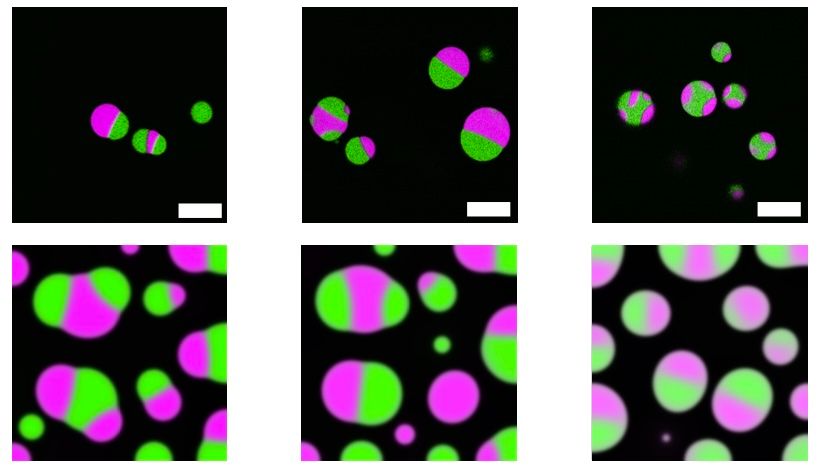
Simulations by Dino Osmanovic @francolab.bsky.social, based on Flory-Huggins, map well onto the experimental trends and allowed us to establish a link between the experimental order parameter and the F-H interaction parameter. Experimental (top) and simulated (bottom) snapshots below 4/n
12.08.2025 23:34 —
👍 3
🔁 1
💬 1
📌 0
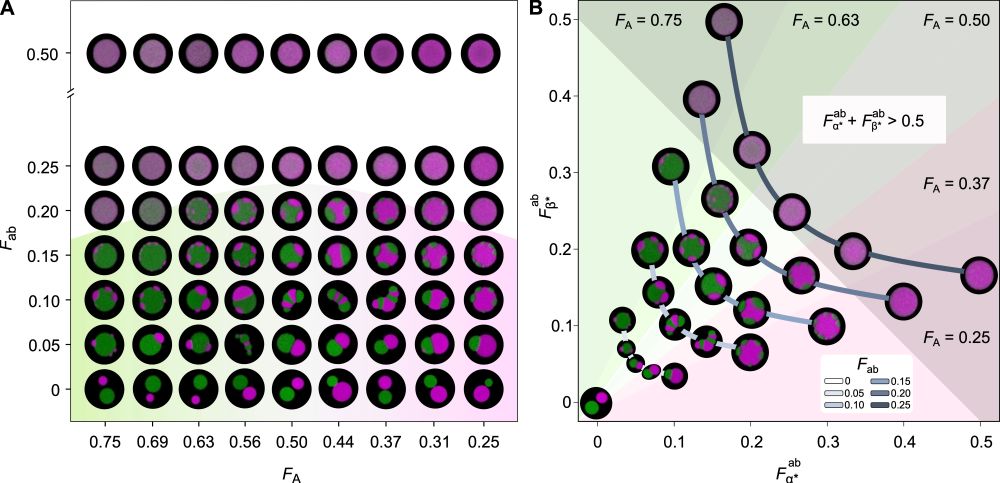
We can control phase behaviour by changing linker and nanostars concentrations, without having to re-design nanostructures. This is rather convenient, and allowed us to map a large phase diagram and identify an order parameter controlling the transition between 1- and 2-phase condensates 3/n
12.08.2025 23:34 —
👍 2
🔁 0
💬 1
📌 0
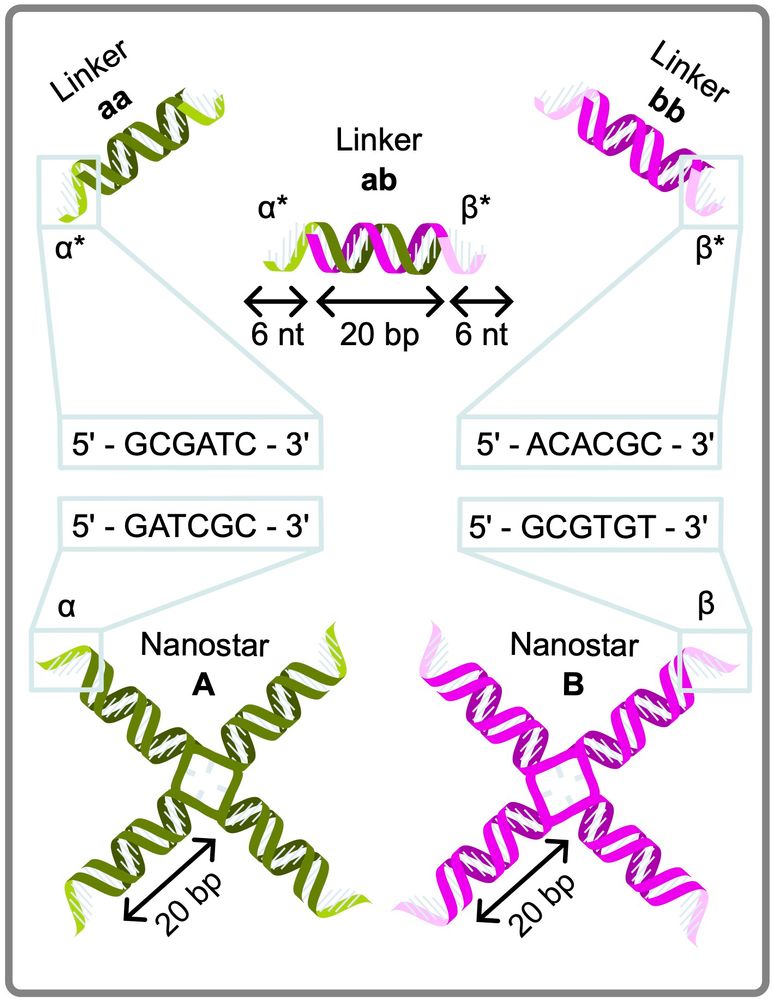
Condensates assemble from two populations of tetravalent DNA nanostars, and three types of divalent linkers that mediate nanostar-nanostar interactions, either within the same nanostar population or across populations 2/n
12.08.2025 23:34 —
👍 3
🔁 0
💬 1
📌 0

Internal Phase Separation in Synthetic DNA Condensates
The modular, programmable system of DNA nanostructures developed provides programmatic control over multiphase condensate behavior, enabling mapping onto a predictive Flory-Huggins model. This combin...
Thrilled to share this new Adv. Sci. paper by @dianatanase.bsky.social with Dino Osmanovic @rogerrubiosanchez.bsky.social @laylamalouf.bsky.social @francolab.bsky.social. We demonstrate a modular approach to program internal phase separation in DNA condensates 1/n doi.org/10.1002/advs...
12.08.2025 23:34 —
👍 17
🔁 7
💬 1
📌 3
Grazie Otti!
12.08.2025 23:01 —
👍 0
🔁 0
💬 0
📌 0
Thanks @ceb.cam.ac.uk @erc.europa.eu @royalsociety.org and BBSRC n/n
09.07.2025 14:22 —
👍 2
🔁 0
💬 0
📌 0
The MLO platform is robust, inducible and modular and many design modifications can be applied to the nanostars to capture different proteins or change MLO properties. Hopefully you’ll find this useful, and we look forward to your feedback! 9/n
09.07.2025 14:22 —
👍 0
🔁 0
💬 1
📌 0
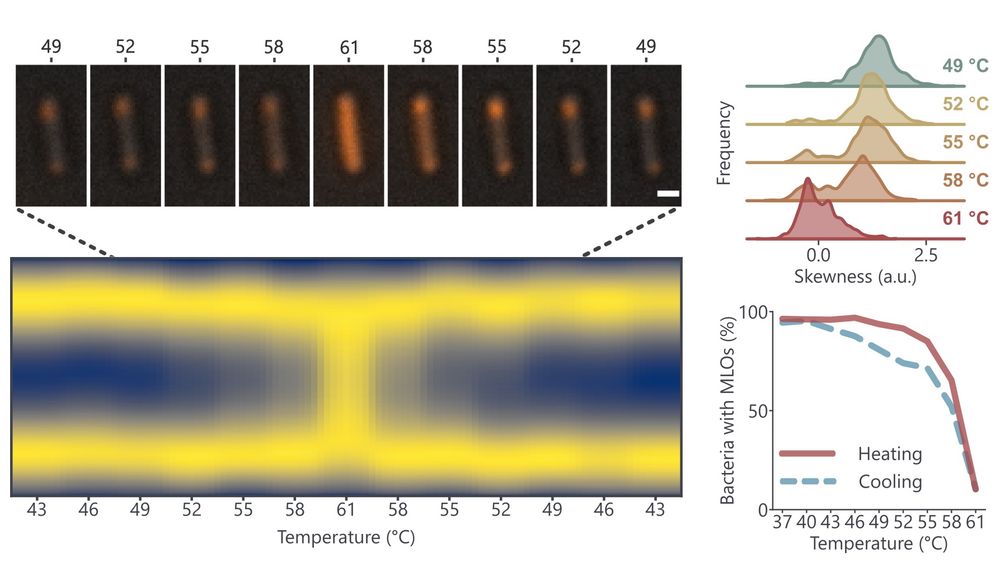
Finally, we show that condensation is thermally reversible. The MLOs melt upon heating and re-assemble upon cooling, releasing and re-capturing GFP in the process 8/n
09.07.2025 14:22 —
👍 0
🔁 0
💬 1
📌 0
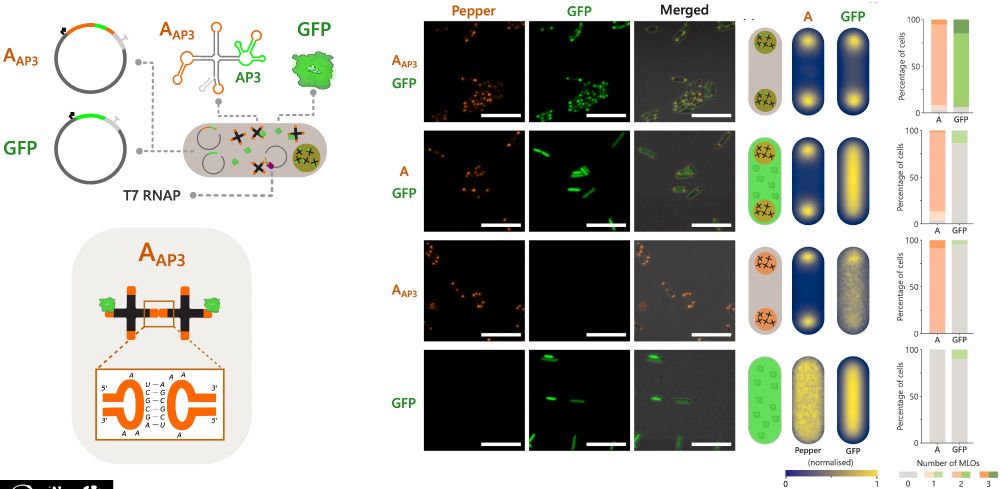
The nanostar designs are modular and allow for embedding of protein binding aptamers. We show that GFP can be selectively captured by the MLOs when a GFP-binding aptamer is included 7/n
09.07.2025 14:22 —
👍 0
🔁 0
💬 1
📌 0
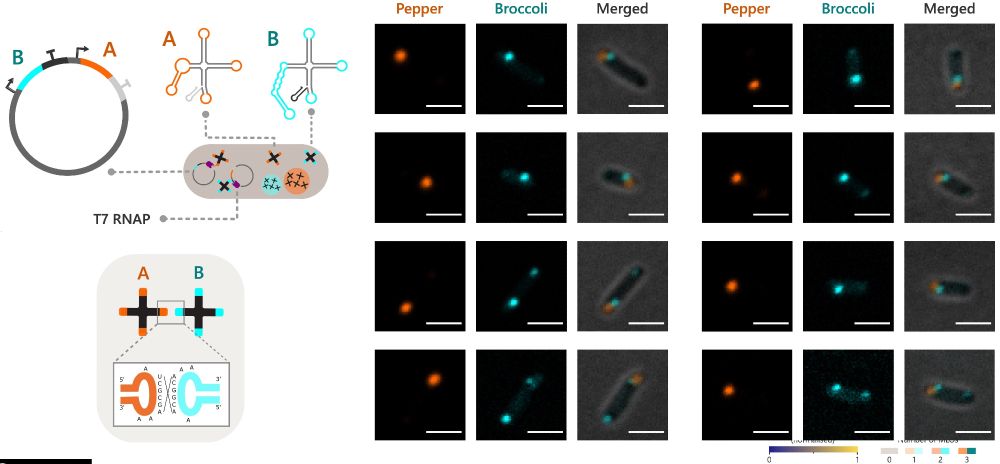
We can express two non-interacting nanostars within the same cell, creating two orthogonal MLOs. This is only possible thanks to the selectivity of base pairing. Also here, most cells will have both MLOs, located at or near the poles 6/n
09.07.2025 14:22 —
👍 0
🔁 0
💬 1
📌 0
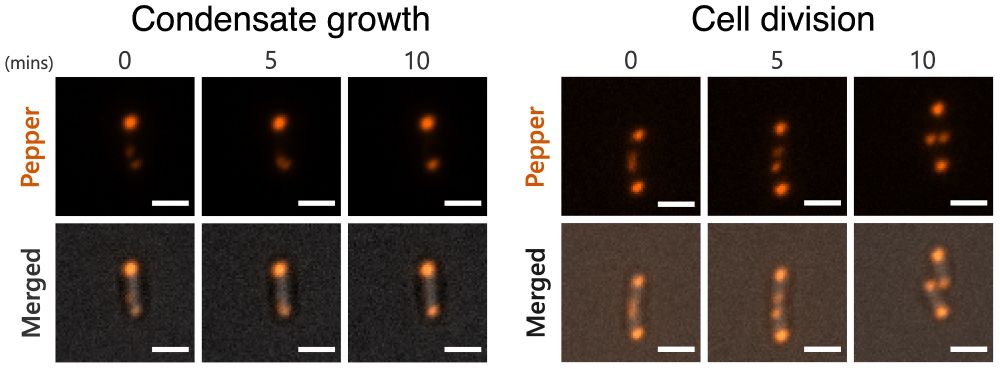
MLOs are located at the cell poles but small RNA clusters may appear near the centre before moving towards the poles. MLOs also tend to appear in the central section as cells approach division. The new MLOs may end up in one of the daughter cells, or be split between both 5/n
09.07.2025 14:22 —
👍 0
🔁 0
💬 1
📌 0
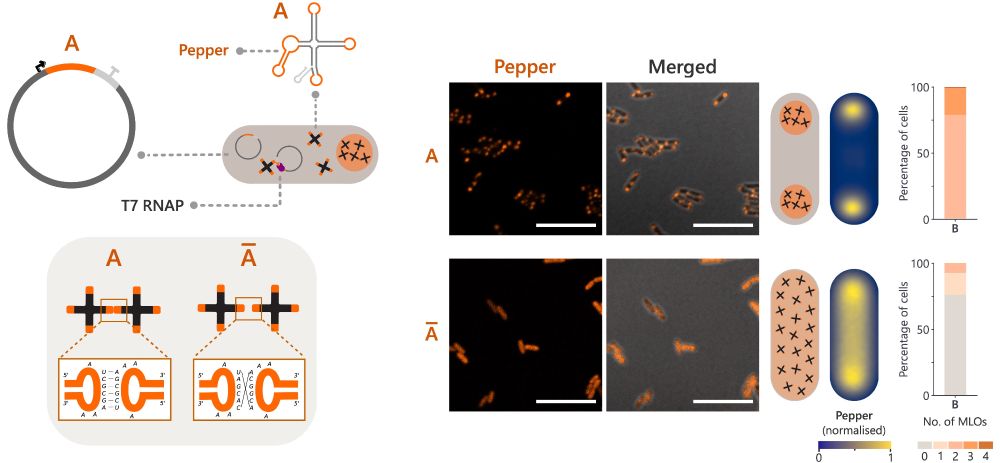
We express RNA “nanostars” interacting with kissing loops (KL) in E. coli and show that these form MLOs located at the poles of the cell. Expression is inducible and very efficient. Making the nanostars non-sticky stops condensation, indicating specificity 4/n
09.07.2025 14:22 —
👍 0
🔁 0
💬 1
📌 0













